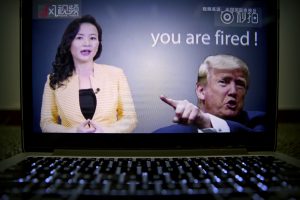China on Tuesday denounced a move by the Trump administration to cap the number of Chinese state-run media journalists who can work in the United States as “based on the Cold War mentality and ideological prejudice.”
The State Department announced Monday that a total of 100 journalists from five outlets would be given visas, citing in part China’s increasingly harsh surveillance, harassment and intimidation of American and other foreign journalists in China for the move.
The decision “severely interrupted Chinese media’s normal reporting tasks in the United States (and) seriously tarnished Chinese media’s reputation,” foreign ministry spokesman Zhao Lijian said Tuesday.
“Based on the Cold War mentality and ideological prejudice, the U.S. State Department suppressed Chinese media agencies with political means in the United States for unexplained reasons,” Zhao said at a daily briefing. China reserves the right to take further measures in response, he said.
The U.S. announcement followed the expulsion last month by China of three Wall Street Journal reporters over an opinion column headline that the foreign ministry called racist, and the release of survey results by the Foreign Correspondents’ Club of China showing a continuing deterioration in working conditions for overseas media in China.
The FCCC report found that Chinese authorities have “weaponized visas” for foreign media by issuing press credentials with shortened terms of validity to a dozen journalists in 2019, in addition to expelling four since August. It called that “one of the most brazen attempts in the post-Mao Zedong era to influence foreign news organizations and to punish those whose work the Chinese government deems unacceptable.”
The U.S. said it is not planning to place any restrictions on the content of Chinese media but that it is seeking “reciprocity” and a “level playing field.”
The five Chinese outlets, including the Xinhua News Agency and China Global Television Network, currently employ about 160 Chinese citizens in the U.S. There are about 75 Americans and other foreigners authorized to work for U.S. news outlets inside China, according to the White House.
Last month, the administration designated Xinhua, CGTN and three others as foreign missions, requiring them to register their properties and employees in the U.S. The State Department said that was in recognition of the fact that “they are effectively controlled” by the Chinese government.
Chinese citizens working for other media organizations in the United States are unaffected by the cap, the State Department said. China’s ruling Communist Party and state outlets now dominate Chinese-language media in the U.S. and have made inroads into the struggling mainstream English-language press through vast ad purchases and the placement of newspaper inserts.
































